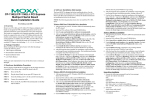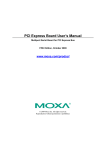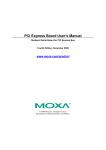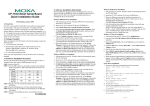Download Moxa CP-132EL-DB9M
Transcript
CP-132EL/CP-132EL-I PCI Express Multiport Serial Board Quick Installation Guide First Edition, July 2008 1. Overview Moxa’s new PCI Express multiport serial boards, the CP-132EL and CP-132EL-I, are designed for POS and ATM applications and for use by industrial automation system manufacturers and system integrators. The boards are compatible with all popular operating systems and support data rates of up to 921.6Kbps as well as full modem control signals, ensuring compatibility with a wide range of serial peripherals. In addition, the CP-132EL and CP-132EL-I work with PCI Express ×1, allowing the boards to be installed in any available PCI Express slot (including ×1, ×2, ×4, ×8, ×16, and ×32). 2. Package Checklist 4. Software Installation Information 3. Select Install from a list or specific location (Advanced). The board MUST be plugged in before installing the driver. See the previous section for instructions on how to install the board in your PC. Refer to the PCI Express Board User’s Manual for detailed instructions on installing the drivers for this board. 4. The board MUST be plugged in before installing the driver. See the previous section for instructions on how to install the board in your PC. Refer to the PCI Express Board User’s Manual for detailed instructions on installing the drivers for this board. After selecting Search for the best driver in these locations, select the Include this location in the search, and then click Browse. If the system is a 32-bit (x86) platform, navigate to the \CP-132EL Series\Software\Windows XP_2003\x86 folder on the CD, if the system is 64-bit (x64) platform, navigate to the \CP-132EL Series\Software\Windows XP_2003\x64 folder on the CD, and then click Next to continue. 5. Click Continue Anyway in response to any warnings that the software has not passed Windows Logo testing. NOTE: The following procedure shows how to install the CP-132EL driver. 6. After the board has been installed, the installation wizard will guide you through the port installation procedure, starting with port 0. 7. Use the Device Manager to check the installation of the board and ports. Click the + sign next to Hardware, and then check Multi-port serial adapters and Ports (COM & LPT). Click the +sign next to Multi-port serial adapters, right-click on Moxa CP-132EL Series (PCI Express Bus), select Properties, then choose Port Configuration. Click the port to configure Interface (RS-422, 2-wire RS-485, 4-wire RS-485) and Termination Resistor (120Ω, Enable or Disable). If there are warning marks, such as a question mark or exclamation point in front of the board or port icons, examine the Event Log to determine the problem. Windows 2008/Vista (32-bit/64-bit) Driver Installation 1. After powering on your PC, Windows 2008 will automatically detect the PCIe board. 2. Insert the PCIe software CD in your CD-ROM drive. 3. Select Locate and install driver software (recommended). 4. After selecting Search for driver software in this location, select the Include subfolders, and then click Browse. If the system is a 32-bit (x86) platform, navigate to the \CP-132EL Series\Software\Windows 2008_Vista\x86 folder on the CD, if the system is 64-bit (x64) platform, navigate to the \CP-132EL Series\Software\Windows 2008_Vista\x64 folder on the CD, and then click Next to continue. Before installing the PCI Express board, verify that the package contains the following items: y 1 PCI Express serial board y Documentation and Software CD y Quick Installation Guide y Low Profile Bracket Notify your sales representative if any of the above items is missing or damaged. 5. 6. After the board has been installed, the installation wizard will guide you through the port installation procedure. Port installation is complete when Port 0 has been set up. 7. Use the Device Manager to check the installation of the board and ports. Click the + sign next to Hardware, and then check Multi-port serial adapters and Ports (COM & LPT). Click the +sign next to Multi-port serial adapters, right-click on MOXA CP-132EL Series (PCI Express Bus), select Properties, then choose Port Configuration. Click the port to configure Interface (RS-422, 2-wire RS-485, 4-wire RS-485) and Termination Resistor (120Ω, Enable or Disable). If there are warning marks, such as a question mark or exclamation point in front of the board or port icons, examine the Event Log to determine the problem. 3. Hardware Installation Procedure The PCI Express board MUST be plugged into the PC before the driver is installed. Follow these steps to install the board in the PC. STEP 1: Power off the PC. STEP 2: Plug the board firmly into an open PCI Express slot. STEP 3: Fasten the holding screw to fix the control board in place. STEP 4: Connect the connection cable. STEP 5: Power on the PC; the BIOS will automatically set the IRQ and I/O address. Click Install this driver software anyway in response to any warnings that the software has not passed Windows Logo testing. Windows 2003/XP (32-bit/64-bit) Driver Installation 1. After powering on your PC, Windows 2003/XP will automatically detect the PCIe board. 2. Insert the PCIe software CD in your CD-ROM drive. P/N: 1802001320020 —1— —2— Windows 2000 Driver Installation 1. After powering on your PC, Windows 2000 will automatically detect the PCIe board. 2. Insert the PCIe software CD in your CD-ROM drive. 3. Select Search for a suitable driver for my device (recommended). 4. Under Optional search location, select specify a location. Navigate to the \CP-132EL Series\Software\Windows 2K folder on the software CD. 5. Click Continue Anyway in response to any warnings that the software has not passed Windows Logo testing. 6. After the board has been installed, the installation wizard will guide you through the port installation procedure, starting with port 0. 7. Use the Device Manager to check the installation of the board and ports. Click the + sign next to Hardware, and then check Multi-port serial adapters and Ports (COM & LPT). Click the +sign next to Multi-port serial adapters, right-click on MOXA CP-132EL Series (PCI Express Bus), select Properties, then choose Port Configuration. Click the port to configure Interface (RS-422, 2-wire RS-485, 4-wire RS-485) and Termination Resistor (120Ω, Enable or Disable). If there are warning marks, such as a question mark or exclamation point in front of the board or —3— port icons, examine the Event Log to determine the problem. Linux Driver Installation assignments to facilitate making your own connection cable, and the male DB9 device-side pin assignments for the optional CBL-M25M9x2-50 cable. 1. Female DB25: Board-side Pin Assignments Execute the following commands from the Linux prompt: #mount /dev/cdrom /mnt/cdrom #cd / #mkdir moxa #cd /moxa #cp /mnt/cdrom/<driver directory>/ driv_linux_smart_vx.x_build_yymmddhh.tgz . #tar –xzvf driv_linux_smart_vx.x_build_yymmddhh.tgz 2. #cd mxser #make clean; make install 3. #cd /moxa/mxser/driver #./msmknod 4. #modprobe mxupcie 5. Use the Moxa Port Configuration Tool to set Interface and Termination Resistor for the MUE series. The MUE series includes CP-102E, CP-102EL, CP-132EL, CP-132EL-I, CP-114EL, and CP-114EL-I. Usage: muestty <operation> device Device: The MUE series device node Operation: -h Help -g Get interface and terminator type -i intf Set interface type with options below -t value Set termination resistor with options below intf RS422 RS-422 mode RS4852W RS-485 2-wire mode RS4854W RS-485 4-wire mode value NONTERM Non termination resistor 120TERM 120ohm termination resistor Port 1 12 8 24 Pin For example: To set the MUE interface # muestty –i RS422 /dev/ttyMUE2 RS-422 P2: TxD-(A) P2: SGND --P2: TxD+(B) --P1: RxD-(A) ----P1: RxD+(B) --P2: RxD-(A) ----P2: RxD+(B) P1: TxD-(A) P1: SGND --P1: TxD+(B) 2 3 4 5 8 9 10 11 12 14 15 16 17 18 21 22 23 24 21 5 2 18 14 Port 2 Transmission Signals 4-wire RS-485 2-wire RS-485 P2: TxD-(A) ----------P2: TxD+(B) ------P1: RxD-(A) P1: Data-(A) --------P1: RxD+(B) P1: Data+(B) ----P2: RxD-(A) P2: Data-(A) --------P2: RxD+(B) P2: Data+(B) P1: TxD-(A) ----------P1: TxD+(B) --- Male DB9 Connector: Device-side Pin Assignments 1 7 8 9 ------- ------- ------- 6. Specifications Hardware Connectors Comm. Controller Interface Bus Interface Number of Ports Max No. of Boards Signal RS-422 RS-485 4-Wire RS-485 2-Wire Performance Baudrate Configuration Data Bits Stop Bits I/O address/IRQ Parity Flow Control Environment Operating Temperature Operating Humidity Storage Temperature ESD Protection Optical Isolation Regulatory Approvals Warranty Female DB25 16C550C compatible PCI Express × 1 2 4 TxD+(B), TxD-(A), RxD+(B), RxD-(A), GND TxD+(B), TxD-(A), RxD+(B), RxD-(A), GND Data+(B), Data-(A), GND 50 bps to 921.6 Kbps 5, 6, 7, 8 1, 1.5, 2 BIOS assigned None, Even, Odd, Space, Mark XON/XOFF 0 to 55°C (32 to 132°F) 5 to 95% RH -20 to 85°C (-4 to 185°F) Embedded 15 KV ESD Protection 2 KV (only for CP-132EL-I) EN55022, EN55024, EN61000-3-2, EN61000-3-3, EN61000-6-2, IEC-61000-4-2, IEC 61000-4-3, IEC 61000-4-4, IEC 61000-4-5, IEC 61000-4-6, IEC 61000-4-8, IEC 61000-4-11, FCC Part 15 Class B 5 years 5 To set the MUE termination resistor # muestty –t 120TERM /dev/ttyMUE2 6. Use the Moxa diagnostic utility to verify the driver status: #cd /moxa/mxser/utility/diag #./msdiag 7. Use the Moxa terminal utility to test the tty ports: #cd /moxa/mxser/utility/term #./msterm 5. Pin Assignments The CP-132EL and CP-132EL-I boards have a female DB25 connector on the board. In this section, we give the on-board connector’s pin —4— 6 Pin 1 2 3 4 5 6 RS-422 TxD-(A) TxD+(B) RxD+(B) RxD-(A) GND --- 9 Transmission Signals 4-wire RS-485 2-wire RS-485 TxD-(A) --TxD+(B) --RxD+(B) Data+(B) RxD-(A) Data-(A) GND GND ----- —5— Click here for online support: www.moxa.com/support The Americas: Europe: Asia-Pacific: China: +1-714-528-6777 (toll-free: 1-888-669-2872) +49-89-3 70 03 99-0 +886-2-8919-1230 +86-21-5258-9955 (toll-free: 800-820-5036) © 2008 Moxa Inc., all rights reserved. Reproduction without permission is prohibited. —6—













